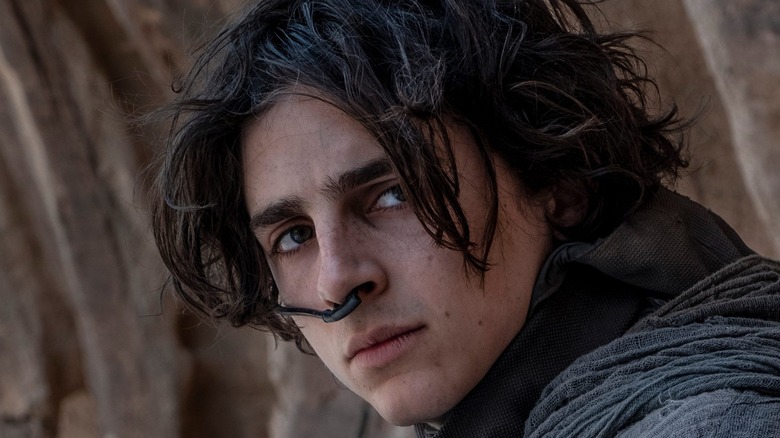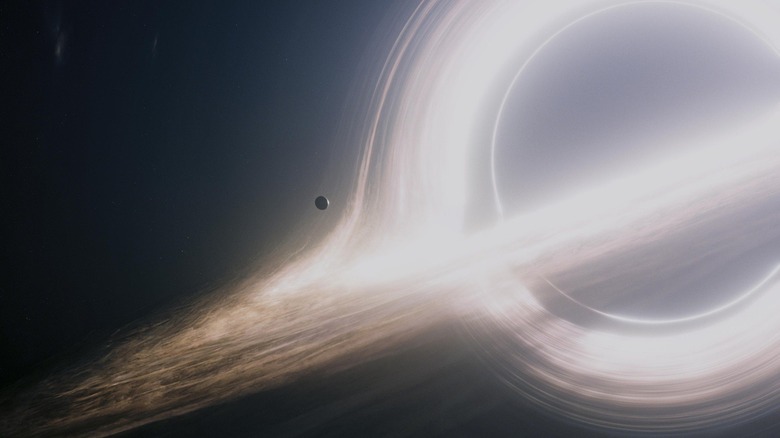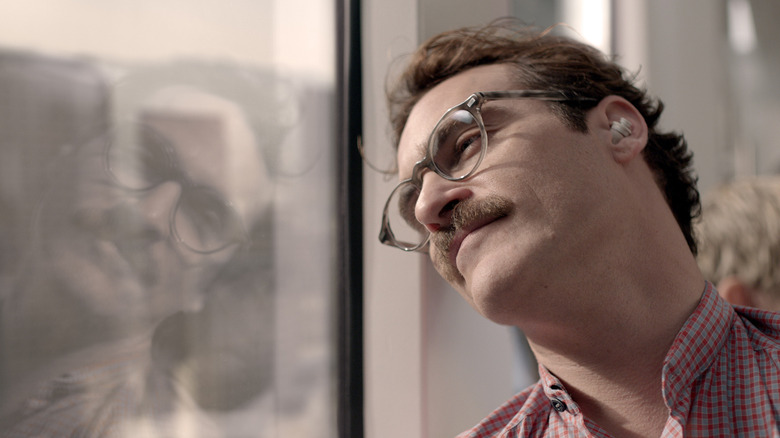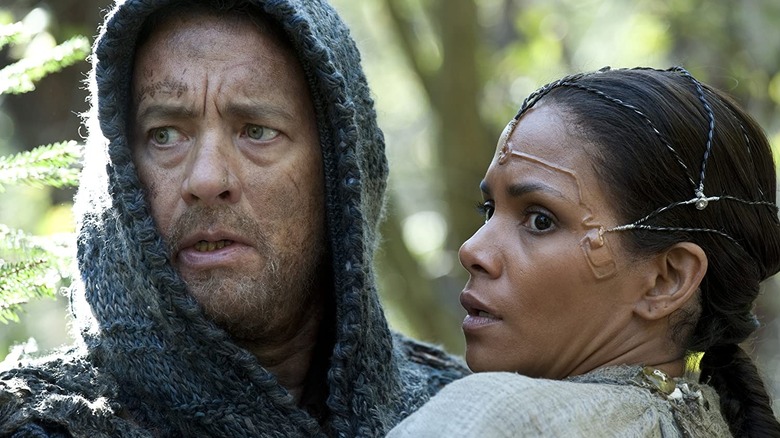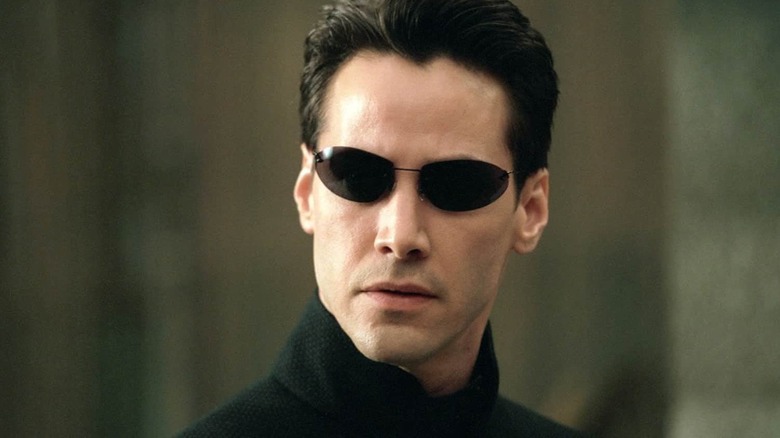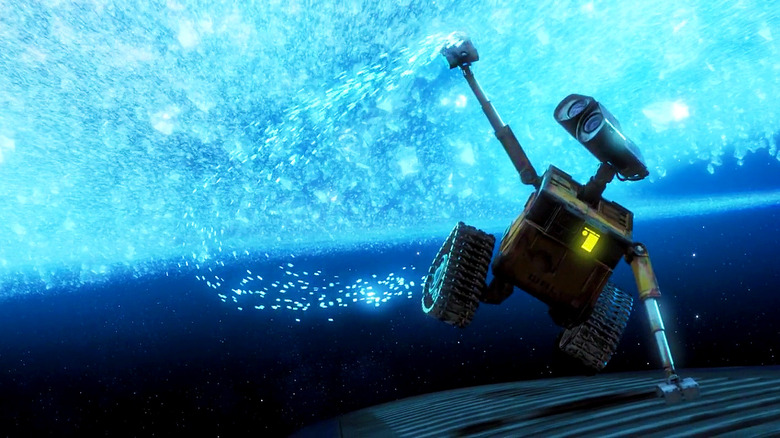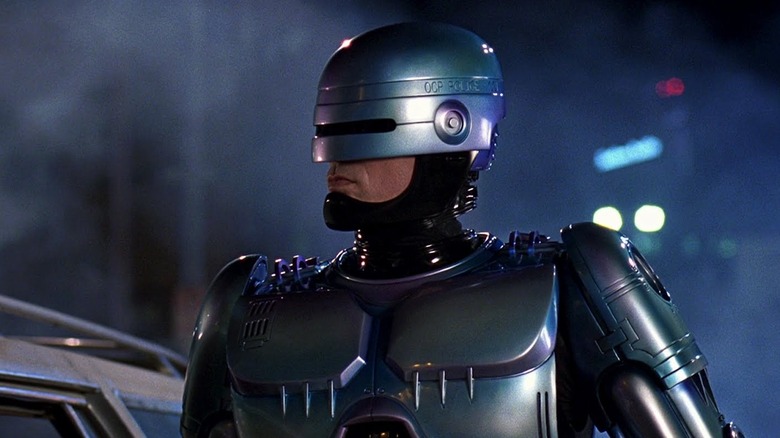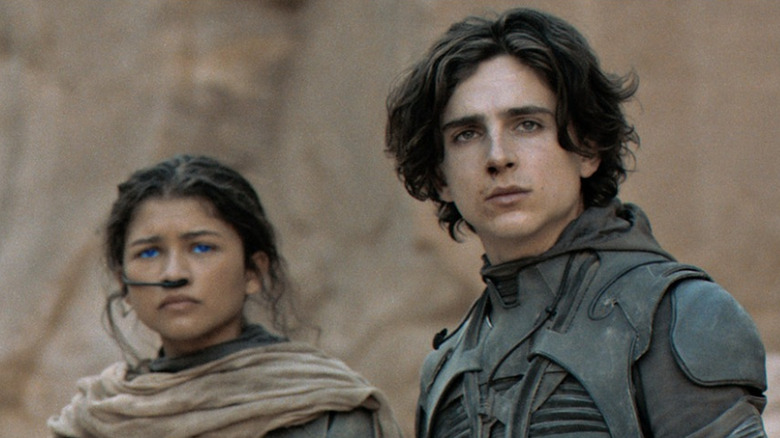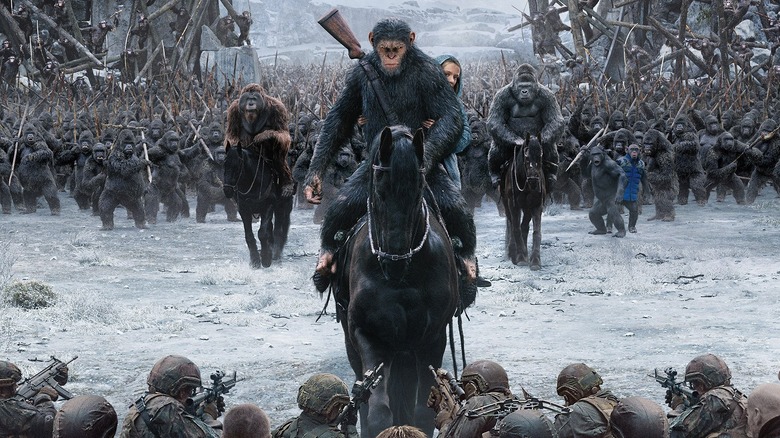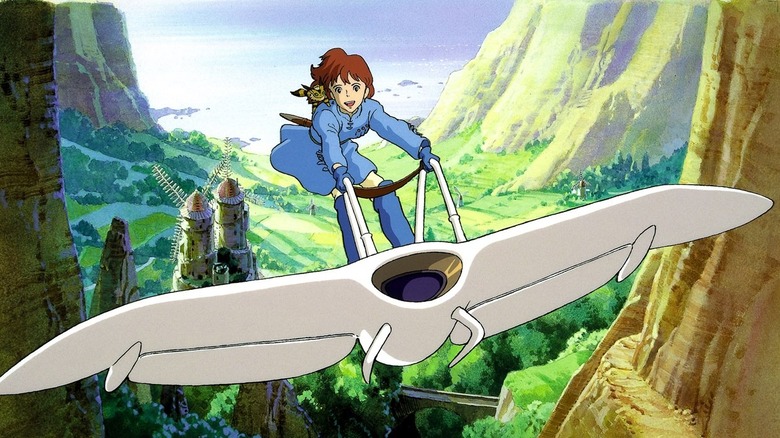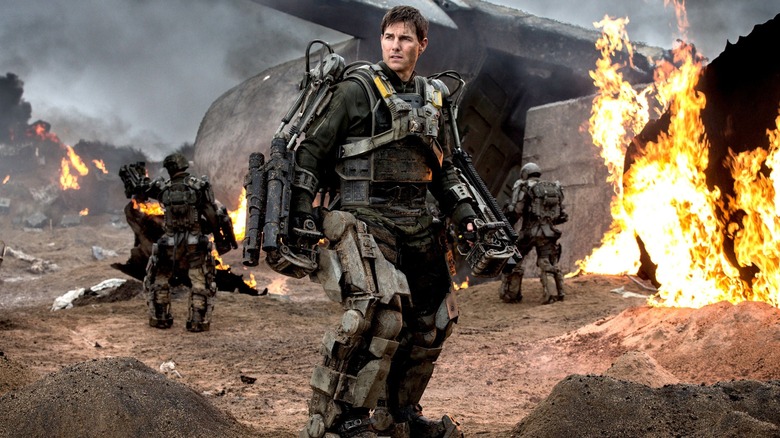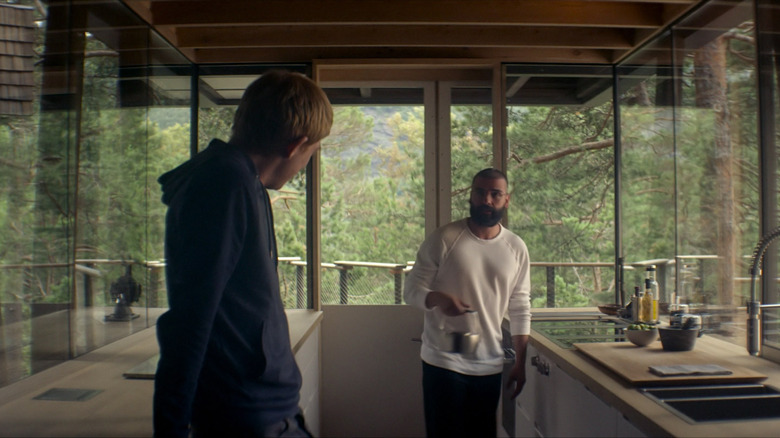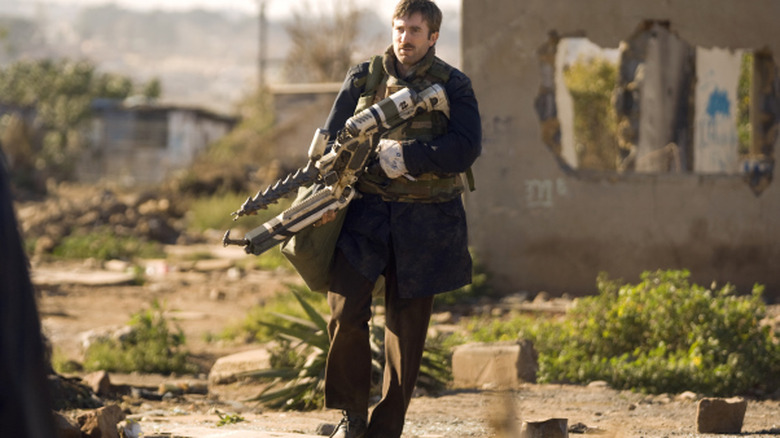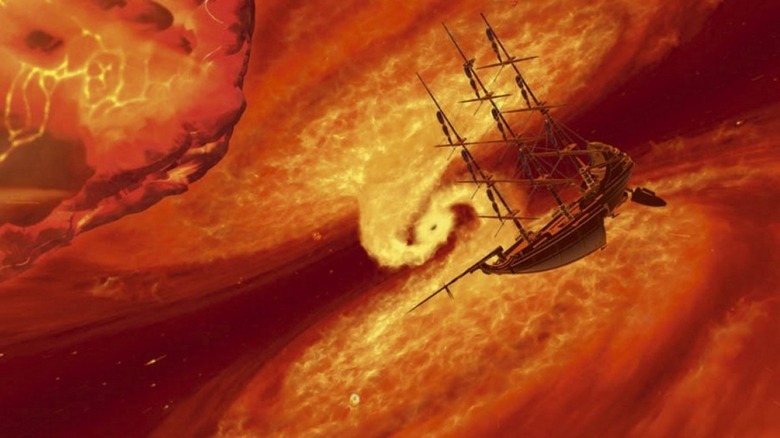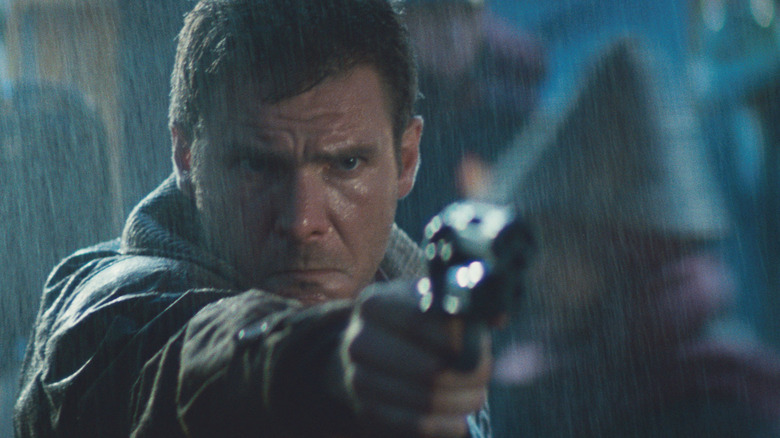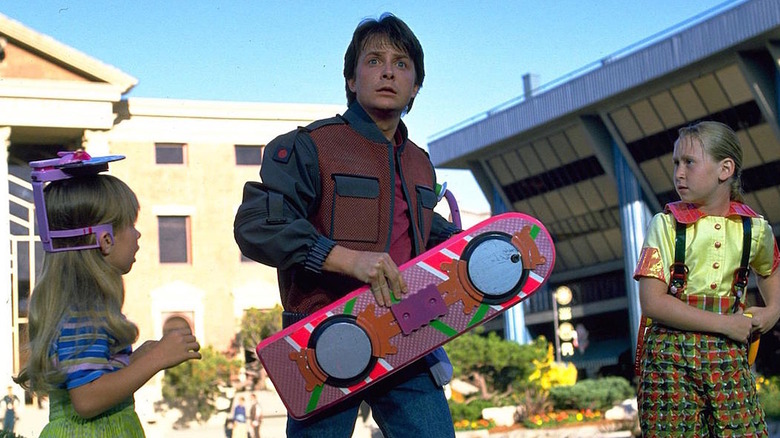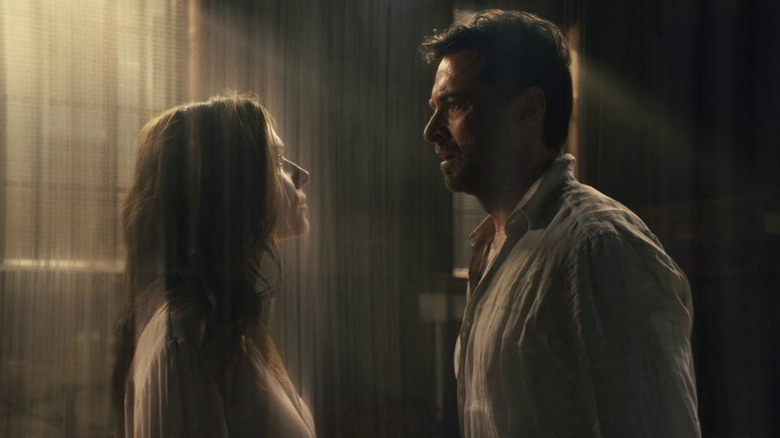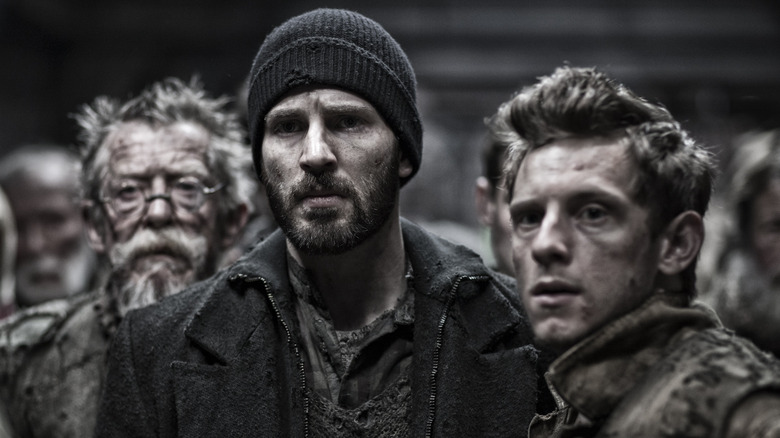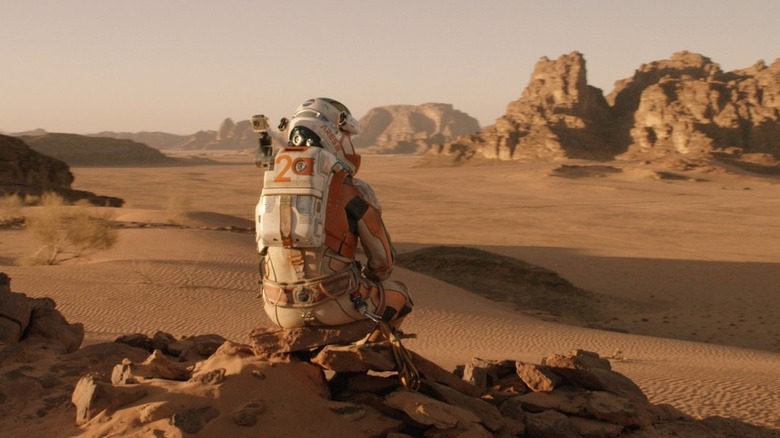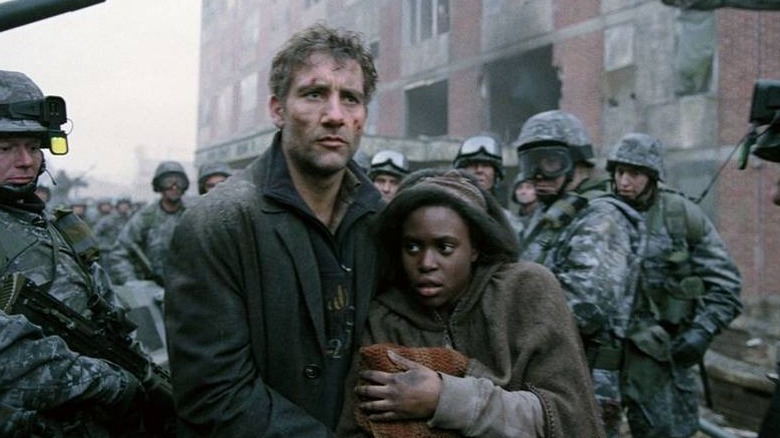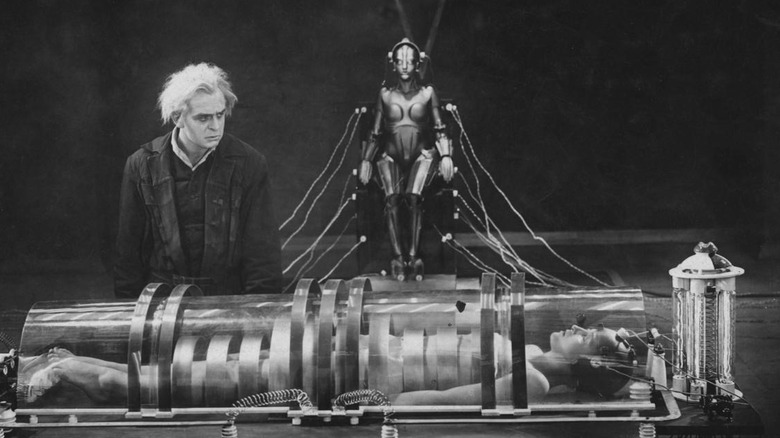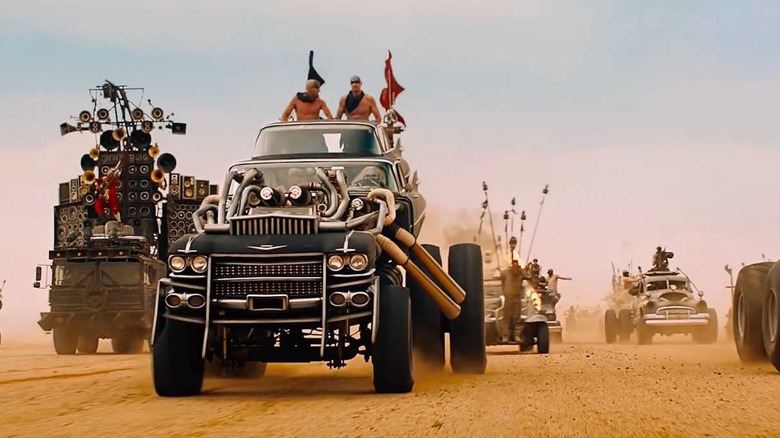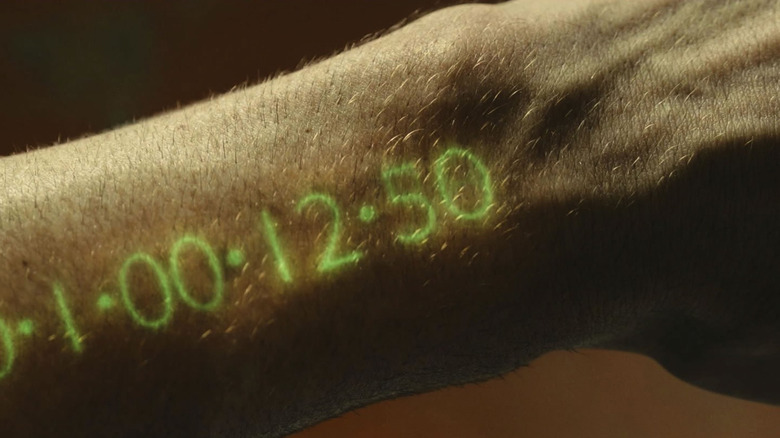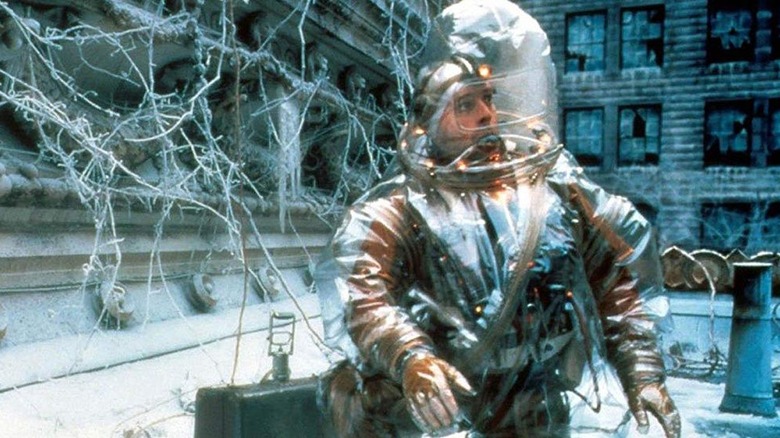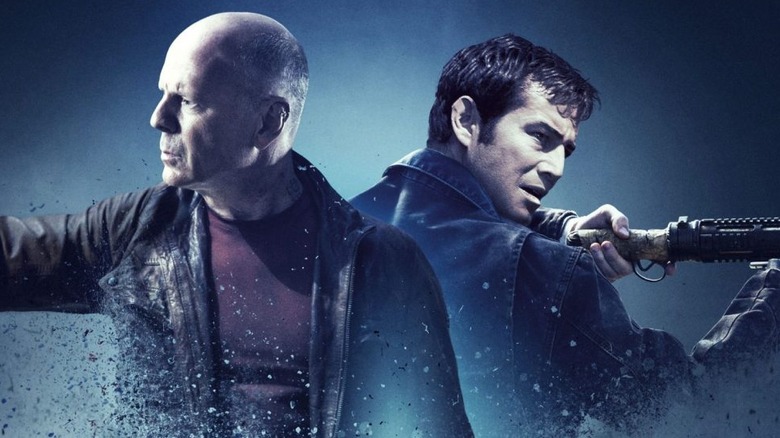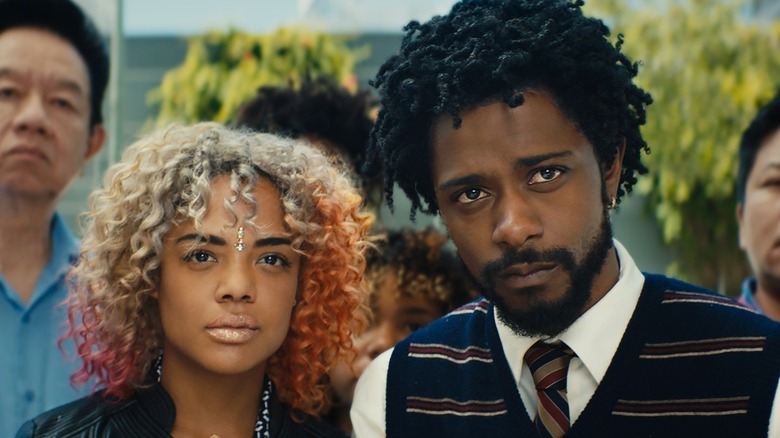25 Movies About The Future Everyone Should Watch
The future: what will it hold for humanity? A utopian civilization where the exponential technological advances of mankind eliminate poverty, hunger, and want? A cybernetic autocracy where sentient A.I. feeds off the electrical energy of imprisoned human bodies? A dystopian wasteland where capitalism's brutal ambivalence towards climate change has devastated the Earth's ecosystem? Or maybe a planet ruled by — stay open minded here — apes?
Describe any possible future, and chances are there's a movie about it. In fact, science fiction media has influenced technological development in numerous ways over the past 150 years. Some of the best films of all time are the ones that imagine what the future might bring, either in the interest of philosophical exploration, or simply because robots and spaceships are fun. Whichever style you're in the mood for, there are a bevy of fantastic cinematic tales waiting to unveil their versions of the future for you.
Here are some great movies that will get you excited — or terrified — about the future, whatever it may bring.
Interstellar (2014)
Christopher Nolan made himself a modern star of the science fiction genre when he released "Inception," which he followed up in 2014 with the even more ambitious "Interstellar." A space odyssey that pulls heavily from Stanley Kubrick's "2001," "Interstellar" stars Matthew McConaughey as a NASA pilot in the year 2067. Drastic ecological changes have made Earth increasingly inhabitable, leading a coalition of scientists to look for other worlds to colonize and ways for humanity to survive.
If you're a fan of modern sci-fi, you've probably already seen "Interstellar." But if you haven't yet, or even if it's been a while, it's deserving of a return visit. The visuals and Hans Zimmer's commanding musical score are just as beautiful and haunting now as they were upon the film's initial release, and with climate change more of an urgent crisis than ever before, the themes of "Interstellar" have only become more powerful and vital. It's a movie that grapples with the very real possibilities of what could become of Earth in the future, while also celebrating our potential for human cooperation and scientific advancement.
To top it all off, "Interstellar" is just a masterfully crafted film. Nolan's talent for pacing, drama, and mystery is clearly evident here, and the performances from McConaughey, Anne Hathaway, Jessica Chastain, Michael Caine, and the rest of the cast are exceptional.
Her (2013)
Ever wonder what would happen if you fell in love with Siri? Fortunately for you, Spike Jonze made a movie to help answer that question.
"Her" takes place in a near-future version of Earth where A.I. embedded in smartphones and computers completely change the cultural makeup of society ... or do they? The film follows the life of Theodore Twombly (Joaquin Phoenix), a writer who, after a split with his wife, develops a romantic relationship with the A.I. in his new phone, Samantha (Scarlett Johansson).
And that's kind of the whole plot.
The common tropes of science fiction suggest a story like "Her" must end badly, with some kind of dire warning being spelled out to the audience to not, under any circumstances, fall in love with your phone. And yet, Jonze's film refrains from that kind of dark ending. It's a movie more interested in questions than answers, focusing more on the possibilities of how technology could change the world than on whether those changes would be objectively good or bad.
Like "Interstellar," "Her" is a masterfully crafted film. Phoenix shines as he so often does, delivering infinite nuance and depth in the subtle mannerisms of the quiet Theodore, and there's an elegance to the film's aesthetic that makes it feel futuristic and realistic at the same time.
Cloud Atlas (2012)
There's an amazing sci-fi movie about human nature and the future written and directed by the Wachowski sisters, and no, we're not talking about "The Matrix." Yet.
"Cloud Atlas" is a complicated, polarizing, and even controversial film. One need only look at it's 66% rating on Rotten Tomatoes to see the division it caused amongst critics, but that score doesn't tell the whole story. At 172 minutes, "Cloud Atlas" is a massive film that covers six distinct storylines in six completely separate time periods, which are connected only by stray documents that survive from one arc to the next. It's the same structure used in the David Mitchell book on which the film is based, but there's disagreement on how well that structure actually works on screen.
Creatively, "Cloud Atlas" is very distinct. The main characters in each of the timelines are played by the same ensemble cast — led by Tom Hanks and Halle Berry — who switch roles and even ethnicities and genders multiple times over the course of the film. This experimental casting approach earned understandable criticism, leading to further polarization. At its core, however, there's something wholly unique about "Cloud Atlas." It's a story about the future, but also a story about the past — about how humans fall into the same patterns of behavior in every era, both good and bad. It's about imprisonment and freedom and identity and connectedness, and it can be pretty messy at times, trying to cram all that together into a single movie. But there's just nothing else like "Cloud Atlas," even a decade after its release.
The Matrix (1999)
Okay, yes, now we can talk about "The Matrix."
If you haven't seen "The Matrix," you should probably watch "The Matrix." If you have seen "The Matrix," you should probably rewatch "The Matrix." And yes — all of them.
Few films have had the impact on science fiction that the Wachowskis' breakout hit has had over the past two decades. Sure, there were plenty of cautionary tales about A.I. and virtual reality, but "The Matrix" took things to another level. The juxtaposition between the slick, cyber aesthetic of the Matrix itself and grim, post-apocalyptic visuals of the outside world is a grim portrait of what could be, but the film's futurism isn't just limited to warning signs about the dangers of technology.
In "The Matrix Resurrections," for instance, humans and certain machines work together in harmony, accomplishing feats that neither could independently. Through all of the films, the series shows both the risks of advanced tech and the potential benefits, while at the same time discussing ideas of human identity, fate, purpose, community, creation, and faith. There's a staggering amount packed into the "Matrix" franchise, and for that reason, some parts can be pretty confusing — especially in the later films. But overall, this is a series that holds up incredibly well and that rewards repeat viewings with new surprises and revelations.
WALL-E (2008)
Pixar films cover a wide range of settings: children's bedrooms filled with sentient toys, retro superhero cities, the depths of the ocean, and yes, even the future. "WALL-E" is still considered by some to be the best animated feature the studio has ever produced (via Vulture), and for good reason. At the time, the vista shots of Earth alone were enough to put all previous animated films to shame. Even covered in cubes of trash, the world created by Pixar in "WALL-E" is stunning, and remains so today. The narrative of heartless corporations turning Earth into an uninhabitable wasteland is more resonant now than ever, and there's still a lot of fun in the simple love story between WALL-E and EVE.
If WALL-E has one drawback, it's that the film's two halves feel a bit uneven. The near-speechless first act is beautiful, haunting, and sweet. The animators milk so much emotion out of WALL-E and EVE that, by the time the film arrives on the human ship, the expectations for the rest of the movie are sky high. Unfortunately, the Axiom portion of "WALL-E" feels a bit more boilerplate. The human characters don't resonate nearly as strongly as the robots do, and the villain storyline feels kind of shoehorned in. Still, "WALL-E" stands as one of the best movies Pixar has ever made and one of the most impressive cinematic achievements of all time.
Robocop (1987)
Speaking of robots, here's a movie with very, very different robots than "WALL-E." "Robocop" is probably remembered best as one of the defining sci-fi action films of the 1980s, alongside "The Terminator" and "Aliens." And that's fair, as the titular Robocop is certainly an action icon. But there's a lot more packed into Paul Verhoeven's gritty science fiction tale than just cool fights. The director is known for including a lot of satire and subtext in his movies, and "Robocop" is no exception.
The movie is primarily a commentary on police corruption and how it's connected to the privatization of security and prioritization of corporate property over public safety. Robocop himself is created by a private tech company, which takes over all policing efforts in Detroit and is ultimately revealed to be destroying the city from the shadows. Police reform is as big of an issue now as it's ever been, and though the issues addressed in "Robocop" don't perfectly map onto the brutality and corruption being protested by many today, many of its themes still resonate.
Dune (2021)
Want to visit the future? "Dune" is about as future as can get — roughly 20,000 years in the future, to be more specific. By the time the actual story of "Dune" begins, humanity has been without A.I., robots, and advanced computers for 10,000 years already — the result of a sort of holy war long in the franchise's past (but our future, it's a little hard to keep track of) in which all such "thinking machines" were destroyed for the threat they posed. That makes "Dune" — Frank Herbert's original novel as well as the 1984 David Lynch and 2021 Denis Villeneuve film adaptations — a particularly unique vision of the future.
For our purposes here, we'll focus on Villeneuve's recent adaptation, but Lynch's film also has merit and Herbert's novel remains an absolute classic decades later. In this "Dune" future, there are no A.I. or virtual realities. Instead, advancement comes through purely humanistic means — selective breeding and genetics programs that span thousands of years, and enhanced mental faculties brought on by rigid training and prolonged exposure to the mind-altering drug melange, more commonly known as spice. But just like the technological advancements in more traditional sci-fi, the human advancements of "Dune" also have their less ethical components.
Villeneuve's film is gorgeous in its audiovisual presentation, it has a star-studded cast, and it brings the distinct world of Herbert's novel to life in breathtaking fashion. "Dune" is much more than a story about the future — it's a story about human nature, faith, politics, religion, science, and family.
Rise of the Planet of the Apes (2011)
The original "Planet of the Apes" is a sci-fi classic, with big themes of humanity's self-destructive nature and how power inevitably corrupts those who wield it. If you haven't seen it and you're okay with some dated special effects, it's definitely worth the watch, but it's not the "Planet of the Apes" movie we're here to talk about today. Instead, we're going to talk about the most recent "Planet of the Apes" trilogy, which began in 2011 with "Rise of the Planet of the Apes" and continued with "Dawn of the Planet of the Apes" and "War for the Planet of the Apes," the last two from director Matt Reeves ("The Batman").
This trilogy, which stars Andy Serkis in a motion capture performance for the ages as the ape leader Caesar, is very different from the originals. It's set in Earth's near future, in a timeline where a dangerous contagion spreads across the planet, killing most humans and leading to the collapse of civilization as we know it. However, that same contagion ends up making the other apes of Earth far smarter, eventually turning them into the dominant species.
What if humanity stopped being the ruling class of Earth? What would rise up in our place, and how would we react? These are the questions posed by the "Rise" trilogy, and they're explored beautifully through the films' stunning special effects, taut action, and elegant writing.
Nausicaä of the Valley of the Wind (1984)
When Hayao Miyazaki made "Nausicaä of the Valley of the Wind, Studio Ghibli hadn't even been officially founded yet. But don't let that fool you — this 1984 sci-fi epic still has all the same traits that would make Miyazaki's later work so great. "Nausicaä" takes place in the far future, a thousand years after an apocalyptic war devastated human civilization and mutated much of the planet's wildlife into deadly beasts.
The main themes here are ones that would continue to resonate through Miyazaki's later films: environmentalism, the importance of living in harmony with nature, and the inherent evil of war and violence. The world shown in "Nausicaä of the Valley of the Wind" pulls from other far-future stories, but its influences don't stop it from looking and feeling strikingly original at the same time. It's a vision of the future that's both cautionary and frightening, but also lovely and peaceful, and it showed early on what the world should expect from Miyazaki's epic films.
Edge of Tomorrow (2014)
Movies about the future tend to get pretty deep into themes of human nature and society at large, and that can get a bit heavy. But science fiction can also be fun, so let's talk about "Edge of Tomorrow."
Based on Hiroshi Sakurazaka's light novel "All You Need Is Kill," Edge of Tomorrow" stars Tom Cruise and Emily Blunt as soldiers defending Earth from a violent alien invasion. It's also a "Groundhog Day"-type story, where the same day and battle is played out over and over again. "Edge of Tomorrow" wasn't set very far in the future even when it was first released, and we've now technically passed the time when it would have taken place. However, the technology and storyline in the film are still definitely futuristic, so it still belongs here.
It's also just a great sci-fi action movie. Blunt and Cruise are terrific, the effects and action scenes are exciting, and the time loop concept ties into the larger story in interesting ways. With a 91% certified fresh rating on Rotten Tomatoes, "Edge of Tomorrow" was great in its day, and it's still great for a first-time watch or rewatch now.
Ex Machina (2014)
Alex Garland's "Ex Machina" is about as near as a near-future can be, with the only real leap from our reality being the A.I. at the center of the film's plot, Ava (Alicia Vikander). Domnhall Gleeson and Oscar Isaac are the only other major actors in the film, as the story itself is very self-contained. But make no mistake, that hyper focus works in the film's favor.
"Ex Machina" is a film about A.I., but it flips the script on the standard formula for such movies. The villains here are human, and the dangers are dangers that humans create — in most cases, dangers to the A.I. itself. It's a story about how men — some decent, some reprehensible — dominate the software industry, and what that could mean for future technological developments. Isaac's character of Nathan Bateman is detestable, and his experiments with A.I. come from all the wrong motivations. But in the interest of avoiding too many spoilers for those who haven't seen the film, we'll leave it at that, along with the strong recommendation that you watch it.
District 9 (2009)
What would happen if aliens really did land on Earth? That's the question "District 9" tries to tackle, and its answers aren't pretty.
Upon its theatrical release in 2009, "District 9" received a warm critical reception, with particular praise directed at its mockumentary framing device and parallels between its sci-fi story and the real horrors of South African Apartheid. The setup for the film is novel, but also quite simple: A spaceship full of alien refugees descends over Johannesburg, and its passengers are permitted to stay in an isolated slum area called District 9. One of the humans managing the area, played masterfully by Sharlto Copley, is accidentally exposed to a substance that transforms him into one of the aliens, all while a plan is being executed within District 9 to refuel the spacecraft and escape.
As a science fiction story "District 9" is fresh and compelling, but as a story about racism and the brutal treatment of refugees, it's even more powerful. Most sci-fi movies make aliens enemies or allies of humanity. Very rarely is there a depiction of extraterrestrial life like the one in "District 9," one in which humans are clearly the villains and the oppressors. It's a unique, haunting take on the genre, and more than a decade after its cinematic premiere, it is still a gem.
Treasure Planet (2002)
The 1990s were a period of immense success for Disney's animated feature films, so much so that it's often referred to as the "Disney Renaissance." "Beauty and the Beast," "Aladdin," "The Lion King," "Mulan," "Tarzan" — all these films and more came out in the span of just one decade, making it one of the most important and acclaimed eras in the company's history.
But we're not here to talk about all the incredibly successful Disney movies that everybody already knows about. We're here to talk about one from 2002 — just a couple years after the end of the renaissance — that too many people have forgotten. "Treasure Planet" is, as the name implies, a sci-fi retelling of Robert Louis Stevenson's classic adventure novel "Treasure Island." It's a gorgeously animated, brilliantly-constructed space saga filled with early 2000s teen angst (right down to a sad boy ballad from the lead singer of The Goo Goo Dolls).
"Treasure Planet" has a powerful future aesthetic, which is definitely the main draw. Spaceships look like pirate ships with giant fusion engines strapped to the back, space itself is full of colorful nebulas and herds of migrating creatures, and every planet and spaceport blends Elizabethan style with future tech in a way that's not quite steampunk and not quite cyberpunk. It's fresh, and the story is touching and fun. "Treasure Planet" may not reside in the Disney pantheon, but that doesn't mean it shouldn't.
Blade Runner (1982)
"Blade Runner" is one of the most influential films in all of science fiction, with a striking vision of the future that helped establish cyberpunk as a subgenre. Ridley Scott found major success creating a dirty, industrial future in 1979's "Alien" (with major credit also due to artist H. R. Giger), and he followed up on that idea in 1982 with "Blade Runner."
Set in the far-flung future of 2019 (whoops), "Blade Runner" tells a noir-inspired saga of freedom, identity, and androids. By this point, the film has become an inextricable component of pop culture, with countless stories pulling influence from it over the years. That may mean that its importance is harder to see today, but at the time, the idea of a smog-filled, neon-lit, overcrowded future wasn't quite so commonplace. The world of Scott's film captivated audiences in '82, and it continues to do so today.
Denis Villeneuve's sequel, "Blade Runner 2049," is a worthy successor and an excellent film in its own right, so check that out too if you haven't already.
Back to the Future Part II (1989)
There are so many heavy and dark movies about the future, but sometimes you need something lighter — something classic. To be fair, only one of the three "Back to the Future" movies, "Back to the Future Part II," has much actual screen time in the future. Like many of the older films on this list, that future date — 2015 — is long behind us now. But come on, hoverboards? Who doesn't love hoverboards?
"Back to the Future" is weird — arguably, at times, too weird. It has problems. But there's still so much to love about the wacky time-traveling hijinks that made it a classic in the '80s. Christopher Lloyd is on another planet of oddball acting, and every second that he's on screen is entertaining. Turning a DeLorean into a time machine? Iconic. Turning a train into a time machine? Equally iconic. It's weird, campy, fun, and weird again.
All these years later, we're still asking: Where are our hoverboards?
Reminiscence (2021)
There are a lot of classic movies about the future, but how about something new? "Reminiscence" didn't get the warmest critical reception when it premiered in 2021, but there's still a lot to love about this twisty neo-noir thriller.
Starring Hugh Jackman, Rebecca Ferguson, and Thandiwe Newton, "Reminiscence" takes place in a near future version of Earth where rising sea levels have turned coastal cities into half-submerged metropolises with harsh class divisions. The story here is pretty standard fare for the genre — man loves woman, woman goes missing, man tries to find her, man gets caught up in major criminal operation with ties to the ruling class. But the fun comes from the memory technology at the center of the story — technology that allows people to relive and even visually project previous moments of their lives over and over again.
The idea of nostalgia becoming a hot commodity in a world faced with crisis and devastation is ... kind of dark, but also full of potential. Unfortunately, "Reminiscence" squanders a lot of that potential by falling into more familiar, tired story tropes. Still, there are a lot of highlights here. The action is stylish, the world itself is striking in its dreariness, and "Into the Badlands" star Daniel Wu stands out wonderfully (if too briefly) as the quick-to-anger crime lord Saint Joe.
"Reminiscence" falls short of what it could have been, but it's still a gripping vision of the future, and a fun ride.
Snowpiercer (2013)
Bong Joon-Ho set the world on fire in 2019 with "Parasite," but the Korean director already had an impressive filmography to his name by then, including "Snowpiercer."
Starring Chris Evans, Song Kang-ho, Ed Harris and Tilda Swinton, "Snowpiercer" is set in a future where efforts to reverse global warming have turned the Earth into an uninhabitable cold planet, where the only place humans can survive is aboard the titular train that circumnavigates the globe at high speeds. Of course, things aren't exactly equal on Snowpiercer, and the class division between the haves and have-nots eventually escalates into open conflict.
Today, "Snowpiercer" has gained some major cultural presence in the English-speaking world because of a TV adaptation on FX (which is also worth checking out). And if you really want to go back to the source, you could check out the original French graphic novel "Le Transperceneige" by Jacques Lob. For right now, though, let's just cover the movie, which received high acclaim upon release and is still great now. It's a strong narrative idea, executed with striking visuals and a great ensemble performance from all involved.
There are plenty of stories about classism in the post-apocalypse, but the distinct style and world-building of "Snowpiercer" set it apart from the rest of the competition. It's fresh, exciting, unsettling at times, and a great watch from start to finish.
The Martian (2015)
Ridley Scott makes his second appearance on this list for the 2015 sci-fi survival film "The Martian," based on the Andy Weir novel of the same name published in 2011. "Cast Away" in space is an easy way to describe this movie, but it's also only part of the truth. In reality, "The Martian" has just as much in common with space disaster films like "Apollo 13," with a pretty large ensemble cast of big stars in addition to Matt Damon's leading performance.
Jessica Chastain, Jeff Daniels, Kristen Wiig, Chiwetel Ejiofor, Sean Bean, Michael Peña, Donald Glover, and Benedict Wong are all in "The Martian," and that's not even the full cast. You'd expect the film's drama to be magnified by so many talented actors, and you'd be right. "The Martian" is a fascinating exploration of what colonization of other planets could look like, the inherent dangers, and how they could be addressed through human ingenuity and cooperation. It's tense, but also encouraging, and the Mars scenes in particular are breathtaking to behold.
This is a pretty specific subgenre, and not for everybody. But if you have love in your heart for survival/disaster movies and love space, "The Martian" is for you.
Children of Men (2006)
Alfonso Cuarón's "Children of Men" is a grim gritty vision of dystopia — a near-future Earth where the entire human race becomes infertile, thrown into disarray by the secret discovery of one young woman capable of giving birth. The movie stars Clive Owen, Clare-Hope Ashitey, Julianne Moore, Michael Caine, and Chiwetel Ejiofor, with a story adapted from P. D. James' 1992 novel of the same name.
"Children of Men" is worth watching for the cinematography alone, which features some of the most staggering long takes in modern cinema. But there's a lot more to the film than just a beautifully dreary production design and impressive camera choreography. The performances are powerful, throwing the raw desperation of the film's reality into the faces of those watching it. It's a movie about hope, but also one about tragedy and cruelty. Like most of Cuarón's films, "Children of Men" is masterfully crafted, from a sharp screenplay to the editing and everything in between. The only reason not to watch it is that it is, to be fair, a bit of a bummer. But even within the film's persistent pessimism, there are still glimmers of better things to come.
Metropolis (1927)
If you love science fiction, then you're probably familiar with the 1927 German silent film "Metropolis," which is rapidly approaching its 100th birthday and still justifiably cited as one of the most influential movies of all time. However, you may not have actually watched the film yourself, and you probably should.
To be fair, watching "Metropolis" hasn't always been easy. The original cut, which ran more than two and a half hours, was lost decades ago, and there have been many different efforts over the years to restore a version as close as possible to the original. The most recent and successful such effort was released in 2010, clocking in at 148 minutes and including nearly all of the original content.
So what's "Metropolis" actually about? The film takes place in a futuristic city, where the rich thrive by exploiting the working class — who toil in deadly machine halls and live underground. The main plot revolves around the son of the city's leader falling in love with a working class organizer and joining the mission to make Metropolis a place of equality. There's also a scary robot lady, which is probably what the movie is most famous for to those who haven't seen it. Today, that story may not sound terribly original, but when you remember that Metropolis was made almost a century ago, it all becomes even more impressive. "Metropolis" is far from what modern movies have become, but as a stylish museum piece, it's worth watching.
The Mad Max series (various years)
In the same way "Blade Runner" made neo-noir cyberpunk a popular sci-fi aesthetic, George Miller's "Mad Max" series set the standard for desert wasteland post-apocalyptic tales, which has since become commonplace in science fiction. From the leather-and-steel aesthetic of the wasteland gangs to near deification of gasoline, "Mad Max" established a lot of big tropes. Today, the series is probably best known for the Academy Award-winning "Mad Max: Fury Road," which is arguably the best entry in the entire franchise. However, there's also still fun to be had in Miller's original "Mad Max" trilogy.
Despite its influence on the future of film, the original "Mad Max" is a little hard to go back to. The production just looks a little old and cheap, which to be fair, it is. But "Mad Max 2," also known as "The Road Warrior," still holds up quite well, and if you enjoy the weirder elements of "Fury Road," "Mad Max: Beyond Thunderdome" is also worth checking out. The whole series just has a specific aesthetic that, no matter how many times it is mimicked, has never quite been fully replicated.
In Time (2011)
With only a 37% aggregate rating on Rotten Tomatoes, 2011's "In Time" might not seem worth the watch on face value. And to be fair, the movie does have a lot of problems, mostly related to the pacing and storytelling. However, there's still a lot to like here. Some prominent critics, including Roger Ebert, enjoyed "In Time" quite a bit, levying praise on its unique premise and vision of the future.
Essentially, "In Time" is about a future where time is the primary currency. The length of people's lives are calculated like bank accounts, and that time can be stolen, bargained, bet, and lost. This creates a world where the rich can live forever, while everyone else has to scrape together anything they can simply to stay alive. It's a world that's dismal, brutal, and full of interesting ideas.
Though those ideas may not be executed as well as they could have been in the final film, "In Time" can still be a fun watch. The cast is full of stars like Justin Timberlake, Amanda Seyfried, Cillian Murphy, Matt Bomer, Alex Pettyfer, Vincent Kartheiser, and Olivia Wilde, and they all play off each other well. "In Time" shows a dangerous future, but also one that's slick with style on the big screen.
12 Monkeys (1995)
"12 Monkeys" is a wild trip of a movie. Directed by "Monty Python" alum Terry Gilliam and starring Bruce Willis, Madeleine Stowe, and Brad Pitt, the film takes place in a future where most of humanity has been wiped out by a mysterious virus. Or, at least, part of the film takes place in that future. The rest is set in various other time periods prior to the extinction event, as Bruce Willis' James Cole character continues to be sent back in time again and again to try to prevent the virus' release.
The story gets confusing pretty quickly, but that's part of the fun in any Gilliam film. "12 Monkeys" is largely about the subjectivity of memory, and that idea manifests in a narrative form that does its best to confuse the viewer. What's real, and what's imagined? It's less a movie about big twists and more a movie about uncertainty — and it rewards repeat viewings.
There's also a TV adaptation from Syfy that's pretty good in its own right, so if you catch the original film and like what you see, maybe give that a chance too.
Looper (2012)
Willis has compared this next film to "12 Monkeys," and together they'd make an amazing double feature.
One of the best time travel films of the 21st century, "Looper" stars Bruce Willis, Emily Blunt, and Joseph Gordon Levitt in a tale written and directed by Rian Johnson ("Knives Out," "Star Wars: The Last Jedi"). This trippy sci-fi action movie pits a hitman from the future against an older version of himself. There are tons of twists and turns, flashy action sequences, and some pretty noble ideas related to the time travel itself.
The success of "Looper" comes largely from how it balances its different elements. The time travel and future tech is interesting, but the movie never gets too deep in the weeds trying to explain how it all works. On the other side of things, the action and thriller aspects of the film are taut and exciting, but they don't dominate so completely that it just becomes a big spectacle without any real substance. "Looper" is fun, explosive, mentally intriguing, and thrilling from start to finish.
Sorry to Bother You (2018)
2018's "Sorry to Bother You" may be the strangest film on this entire list, but it's also one of the best. Written and directed by Boots Riley and starring LaKeith Stanfield, Tessa Thompson, Omari Hardwick, and Terry Crews, it's a surreal dark comedy about capitalist corruption, labor exploitation, anti-Black racism, and genetic mutation. The film packs a lot into just 112 minutes, and it's all brilliantly comic while also being incredibly dark.
The basic plot of "Sorry to Bother You" revolves around lead protagonist Cash (Stanfield) starting work as a telemarketer, where he finds great success after he begins using his "white voice" on the phone. His world is clearly dystopian, but it also resembles our own very closely, making the more brutal divergences more striking. Through the story, Cash becomes involved with a growing labor movement, an upper class of rich and immoral corporatists, and a strange scientific experiment with dramatic repercussions (you may already know what happens, but if not, you'll certainly never predict it).
It's gripping, powerful, fun, and stylish — an impressive showing from all the creators involved, and just like any great sci-fi, profoundly thought-provoking.
